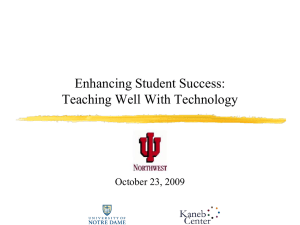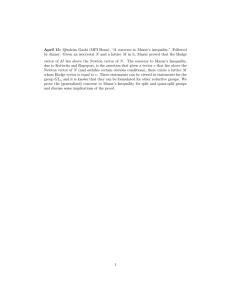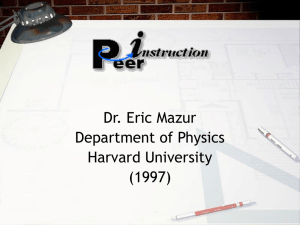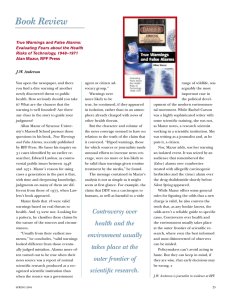Environmental Policy, PAF 451 Fall 2015 Professor Allan Mazur
advertisement
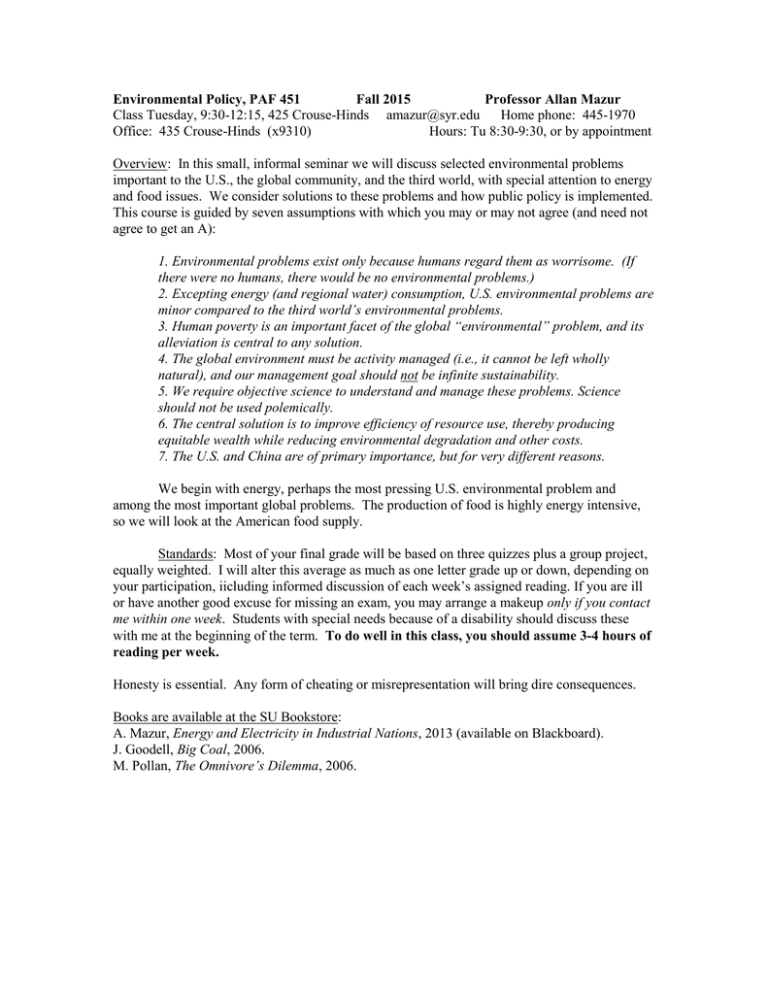
Environmental Policy, PAF 451 Fall 2015 Professor Allan Mazur Class Tuesday, 9:30-12:15, 425 Crouse-Hinds amazur@syr.edu Home phone: 445-1970 Office: 435 Crouse-Hinds (x9310) Hours: Tu 8:30-9:30, or by appointment Overview: In this small, informal seminar we will discuss selected environmental problems important to the U.S., the global community, and the third world, with special attention to energy and food issues. We consider solutions to these problems and how public policy is implemented. This course is guided by seven assumptions with which you may or may not agree (and need not agree to get an A): 1. Environmental problems exist only because humans regard them as worrisome. (If there were no humans, there would be no environmental problems.) 2. Excepting energy (and regional water) consumption, U.S. environmental problems are minor compared to the third world’s environmental problems. 3. Human poverty is an important facet of the global “environmental” problem, and its alleviation is central to any solution. 4. The global environment must be activity managed (i.e., it cannot be left wholly natural), and our management goal should not be infinite sustainability. 5. We require objective science to understand and manage these problems. Science should not be used polemically. 6. The central solution is to improve efficiency of resource use, thereby producing equitable wealth while reducing environmental degradation and other costs. 7. The U.S. and China are of primary importance, but for very different reasons. We begin with energy, perhaps the most pressing U.S. environmental problem and among the most important global problems. The production of food is highly energy intensive, so we will look at the American food supply. Standards: Most of your final grade will be based on three quizzes plus a group project, equally weighted. I will alter this average as much as one letter grade up or down, depending on your participation, iicluding informed discussion of each week’s assigned reading. If you are ill or have another good excuse for missing an exam, you may arrange a makeup only if you contact me within one week. Students with special needs because of a disability should discuss these with me at the beginning of the term. To do well in this class, you should assume 3-4 hours of reading per week. Honesty is essential. Any form of cheating or misrepresentation will bring dire consequences. Books are available at the SU Bookstore: A. Mazur, Energy and Electricity in Industrial Nations, 2013 (available on Blackboard). J. Goodell, Big Coal, 2006. M. Pollan, The Omnivore’s Dilemma, 2006. Mazur, PAF 451 Schedule of Topics and Assignments DATE Sep 1 TOPIC Introduction TO BE READ/DONE Climate and coal Goodell, pp. xi-96 15 “ Goodell, pp. 97-172 22 Quiz #1 Goodell, pp. 173-260 29 The Big Picture Mazur, Preface and Part I Oct 6 Energy sources Mazur, Part II and III 13 Technical controversies Mazur, Part IV 20 Quiz #2 Mazur, Part V 27 Food Pollan, pp. 1-108 Nov 3 “ Pollan, pp, 123-207 10 “ Pollan, pp. 208-262 17 Quiz #3 Define group project 8 24 Dec 1 8 -- Thanksgiving Break -Federal environmental policy Work on group project Complete group project Submit group report by Dec. 12 The Syracuse University Academic Integrity Policy holds students accountable for the integrity of the work they submit. Students should be familiar with the Policy and know that it is their responsibility to learn about instructor and general academic expectations with regard to proper citation of sources in written work. The policy also governs the integrity of work submitted in exams and assignments as well as the veracity of signatures on attendance sheets and other verifications of participation in class activities. Serious sanctions can result from academic dishonesty of any sort. For complete policy, see http://academicintegrity.syr.edu Students who are in need of disability-related academic accommodations must register with the Office of Disability Services (ODS), 804 University Avenue, Room 309, 315-443-4498. Students with authorized disability-related accommodations should provide a current Accommodation Authorization Letter from ODS to the instructor and review those accommodations with the instructor. Accommodations, such as exam administration, are not provided retroactively; therefore, planning for accommodations as early as possible is necessary. For further information, see the ODS website, Office of Disability Services http://disabilityservices.syr.edu/
